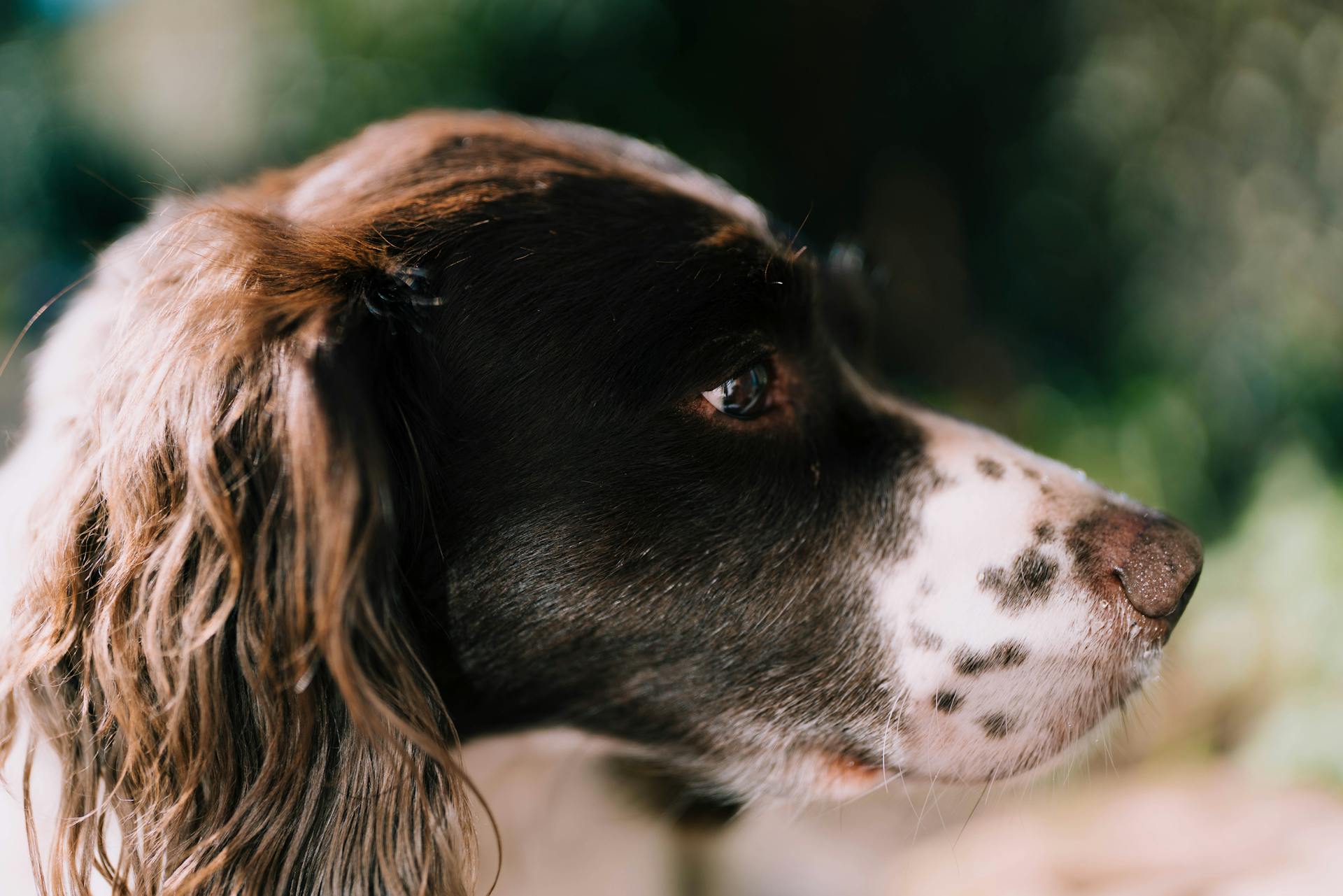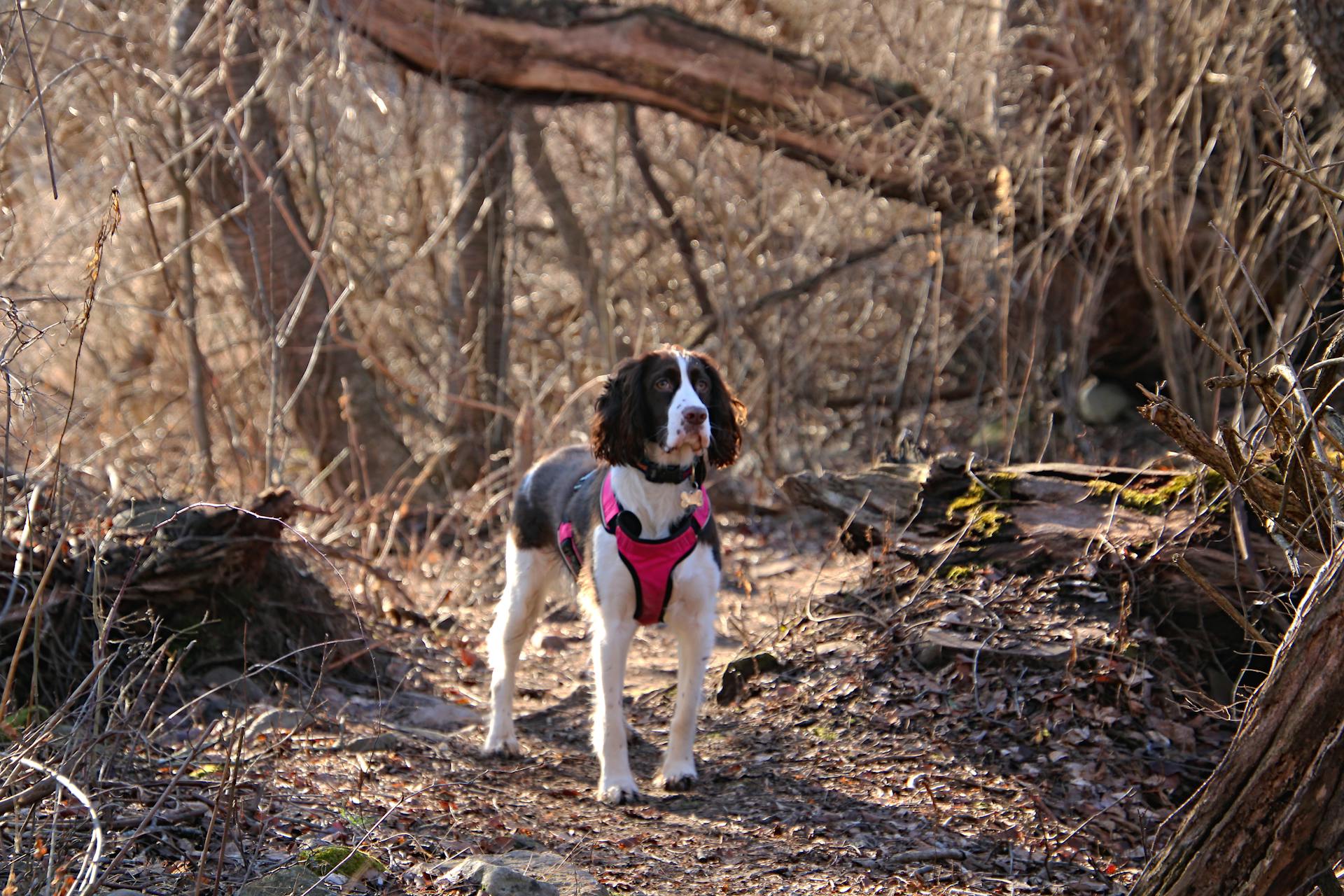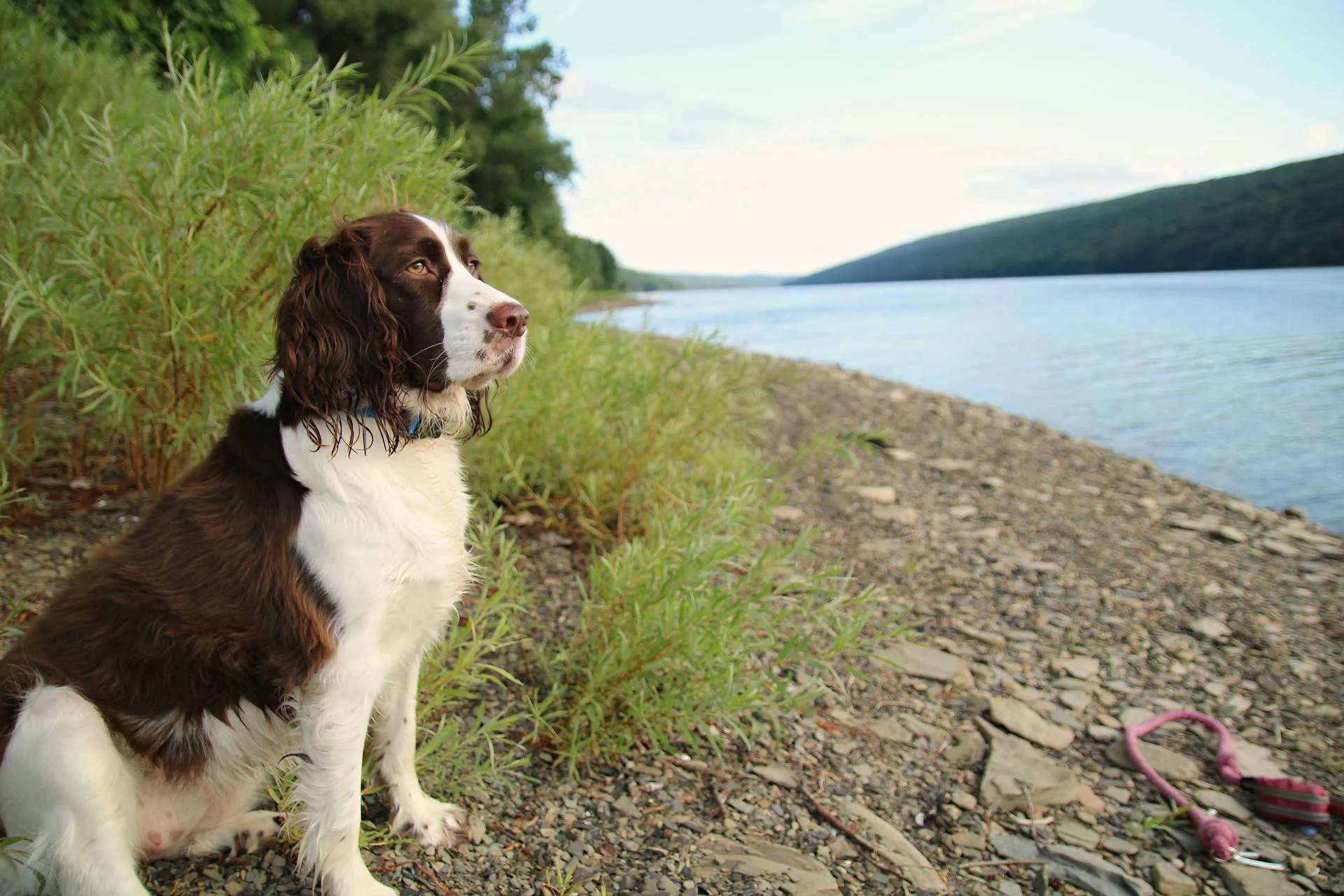
The English Springer Spaniel is a beloved breed known for their friendly and outgoing personalities.
Their medium-sized build typically ranges from 19-24 inches in height and 35-50 pounds in weight.
English Springer Spaniels have a moderate energy level, requiring regular exercise to stay happy and healthy.
They excel in activities such as hunting and agility training, making them a great fit for active owners.
Their beautiful coat requires regular grooming to prevent matting and tangling.
Their friendly nature makes them an excellent choice for families with children.
English Springer Spaniel
The English Springer Spaniel is a medium-sized breed that stands between 19-20 inches at the shoulders, weighing between 40-50 pounds. They have a moderate-length coat with feathering behind the legs, ears, and tail.
Their coat color can vary, but the AKC-approved colors are liver/white, black/white, tri-color, and blue or liver roan. They can also have lemon and white, orange and white, or red and white with marking descriptions or a spotted or ticked roan, although these are rare and considered non-standard.
Take a look at this: Rare English Bulldog Colors
English Springer Spaniels are known for their intelligence, biddability, and eager personalities. They are fun-loving dogs who enjoy being with their people and are quick to learn. In the field, they are quick-running and cover ground efficiently with a natural quarter.
Their tails can be docked or undocked, with bench dogs typically having tails docked around ¼ length and field dogs having tails docked around ¾ length. However, the AKC has recently approved giving equal consideration to docked or undocked tails in the conformation ring.
Here are the average AKC registrations for English Springer Spaniels over the last three years:
English Springer Spaniels are prone to health issues such as ear infections, some hereditary eye disorders, hip dysplasia, and elbow issues.
Physical Characteristics
The English Springer Spaniel is a medium-sized breed, with females typically standing around 19 inches at the shoulders and males slightly taller at 20 inches. They weigh between 40 and 50 pounds.
Their coats are moderately long with feathering on the legs and tail, and vary in coarseness. Field-bred dogs tend to have shorter, coarser coats than show-bred dogs.
The English Springer Spaniel's tail is a notable feature, with bench dogs typically docked at ¼ length and field dogs docked around ¾ length. In some countries, the tails are left intact due to docking laws.
Here's a comparison of the size and weight of English Springer Spaniels:
Their ears are less pendulous in field-bred dogs, and they tend to have a more wiry, feral look. Show dogs, on the other hand, have longer fur and more pendant ears.
Characteristics
The English Springer Spaniel is a medium-sized breed, typically ranging from 19-21 inches in height and weighing between 40-60 pounds. Their size can vary depending on whether they're bred for the show ring or for field work.
Their coats are moderately long and can vary in coarseness, with feathering on the legs, tail, and ears. They come in a range of colors, including liver/white, black/white, tri-color, and blue or liver roan.
Consider reading: Liver and White English Springer Spaniel
Field-bred English Springer Spaniels tend to have shorter, coarser coats than show-bred dogs. Their ears are less pendulous, and their tails may be docked to a shorter length.
Here's a comparison of the characteristics of show-bred and field-bred English Springer Spaniels:
In terms of their overall appearance, English Springer Spaniels have a gentle expression and a well-proportioned, balanced body. However, there can be a significant difference between field-bred and show-bred dogs, with the former often having a more wiry and feral appearance.
The Neck
The neck is an essential part of a horse's physical characteristics, and it's easy to spot a well-proportioned one.
A good neck length is essential, and it's described as being just right, not too long or too short.
It's also strong and muscular, which is crucial for supporting the horse's head and neck.
A free and smooth throat is also desirable, free from throatiness.
A slightly arched neck is also preferred, which gives the horse a elegant and refined look.
Explore further: Horse Breed
Forequarters

The forequarters of this breed are a sight to behold, with forelegs that are straight and well boned.
These straight forelegs provide a solid foundation for the dog's overall structure. Shoulders are sloping and well laid, which helps with flexibility and movement. Elbows are set well to the body, preventing any awkward angles. Strong and flexible pasterns connect the legs to the body, allowing for smooth movement.
Hindquarters
When evaluating the hindquarters of an animal, it's essential to take note of the position of the hindlegs. They should be well let down.
A well-developed hindquarter is characterized by broad, muscular thighs. The stifles and hocks should be moderately bent, which is a desirable trait.
Coat and Colors
The English Springer Spaniel's coat is a key characteristic of the breed. It's generally shorter and coarser than that of show-bred dogs.
Field-bred dogs typically shed only in the summer and spring months, but may shed occasionally in autumn.
The coat comes in a variety of colors, including black, liver, and white.
White markings can be found on the face, chest, and paws, and may be flecked with ticking.
The English Springer Spaniel is known for its distinctive tricolour pattern, which features black and white or liver and white with tan markings.
Tan markings are often found on the eyebrows, cheeks, inside of the ears, and under the tail.
Gait and Movement
The English Springer Spaniel's gait is truly unique and effortless. Their forelegs swing straight forward from the shoulder, throwing their feet well forward in an easy, free manner.
Their hocks drive well under the body, following in line with the forelegs, creating a smooth and natural motion.
At slow movement, they may exhibit a pacing stride typical of this breed, showcasing their athletic ability.
History and Origin
The English Springer Spaniel breed has a rich history that dates back centuries. Evidence suggests that spaniel-type dogs existed in the U.K. as early as 300 AD.
Their original purpose was to serve as a hunting dog, specifically designed to "spring" game for hawks and falcons. By the 17th century, the spaniel thrived at flushing game for "flying shooting" hunting.
In the 19th century, dogs from the same litters were being separated into "springing" and "cocking" classes, based primarily on size and weight. This eventually led to the separation of the cocker and springer into genetically different breeds.
The English Springer Spaniel breed was officially recognized by the English Kennel Club in 1902, and the American Kennel Club followed in 1910. The breed has since become a popular choice for hunting and field trials across North America.
Their ancestors were used to hunt woodcock, and the smaller dogs from these litters were used for this purpose, ultimately leading to the establishment of the Cocker Spaniel breed.
Working Ability
English Springer Spaniels are natural retrievers for water work, and they excel in this area with enthusiasm and speed, regardless of terrain or water.
Recommended read: English Water Spaniel
Their strong noses, combined with their quartering pattern and pace, enable them to cover large areas with ease and fearlessly search through cover. This makes them a valuable asset in hunting.
In field trials, Springers are required to complete back-to-back retrieves as part of the scoring, and to be titled, they must pass a water test involving two open water retrieves of dead game.
Field Search
Springers are incredibly skilled at field search due to their strong noses and quartering pattern, which allows them to cover large areas with ease.
A dog's flush should be of sufficient force and intensity to spring game well within gun range, and their instincts can be further developed by their handler or trainer to meet their needs.
Springers are fearless in cover, thanks to their strong noses and quick pace, making them a valuable asset in the field.
Water Work
Springers are natural retrievers for water work, and they take their tasks enthusiastically, regardless of terrain or water. They're designed to excel in field trials, where completing retrieves is a crucial part of the scoring.

In order to be titled, Springers must pass a water test, which involves completing back-to-back retrieves in open water. A soft mouth is a valuable trait in Springers, resulting in the returned game being undamaged.
Springers are permitted to run in AKC retriever hunt tests as of 2022. This is a testament to their natural ability and enthusiasm for water work.
Care and Maintenance
Their grooming requirements are relatively easy to manage, as brushing them out a few times a week is usually sufficient.
English Springer Spaniels are moderate shedders, so be prepared for some hair in your home.
Brushing their teeth daily is crucial to keep up with oral hygiene, just like brushing your own teeth.
Their longer coats don't require a lot of work to maintain, but they may need more frequent brushing if they spend a lot of time outdoors.
Training and Temperament
The English Springer Spaniel is a breed that's all about being friendly and happy, with a strong desire to please their owners. They're highly intelligent and love to learn.
With their high intelligence levels, training is relatively easy, but consistency is key. Aim for one daily training session of 10-15 minutes, using positive reinforcement and treats to keep them engaged.
English Springer Spaniels are natural pack animals and love being part of a family, but they may bond strongly with one person, which can be ideal for hunting companions.
Their intelligence and trainability also make them excel in activities like agility and hunting competitions, where they can use their natural desire to work and please their owners.
In terms of temperament, English Springer Spaniels are generally great with children and other animals, but field-bred Springers may have a stronger prey drive, so it's essential to socialize them well.
Their high energy levels mean they need both physical and mental stimulation, so be prepared to provide plenty of exercise and activities to keep them happy and engaged.
English Springer Spaniels are quick to learn and pick up cues, but they do need consistent training and practice to reach their full potential.
Their strong desire to please their owners and work makes them an excellent breed for first-time dog owners, but it's essential to remember that they'll always be happiest when they have a job to do.
Take a look at this: How to Train English Bulldog
Frequently Asked Questions
What are the 2 types of Springer Spaniels?
There are two main types of Springer Spaniels: working and show types, with distinct physical characteristics and temperaments. Working Springers are bred for intelligence and trainability, while show Springers prioritize appearance.
Sources
- https://www.thekennelclub.org.uk/breed-standards/gundog/spaniel-english-springer/
- https://en.wikipedia.org/wiki/English_Springer_Spaniel
- https://www.dogster.com/dog-breeds/english-springer-spaniel
- https://projectupland.com/hunting-dogs/english-springer-spaniel/
- https://www.dailypaws.com/dogs-puppies/dog-breeds/english-springer-spaniel
Featured Images: pexels.com


